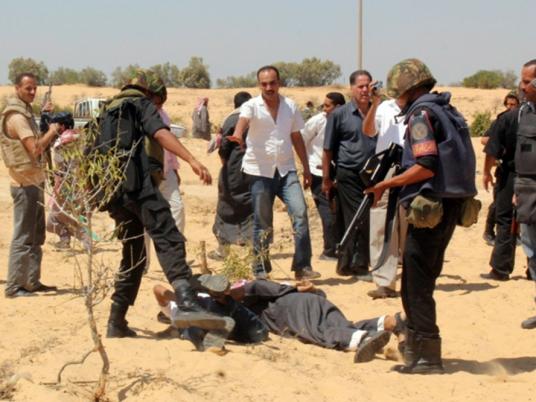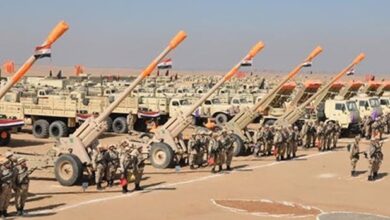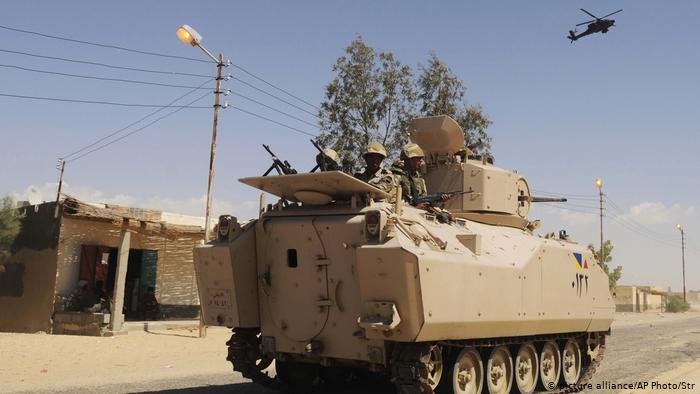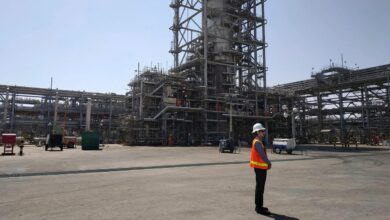
The repeated attacks on police forces in Sinai and the ongoing investigation of a “terrorist cell” in Nasr City have opened the door for a flood of conspiracy theories and a renewed focus on the deteriorating security situation in the strategic peninsula.
State-run Al-Akhbar newspaper reports that police have captured three additional suspects in the Nasr City case, increasing the total number of suspects to 12.
The interior minister told the paper that investigations indicate the raided Nasr City apartment was a site for theoretical training for the terrorist cell, while the practical training was planned to take place in the Libyan desert.
The minister also said security forces found large amounts of highly explosive material in the apartment.
With “The details of the grand conspiracy on Sinai” as its main headline, privately-owned Al-Watan proceeds to describe multiple dangers surrounding Sinai, accusing police forces of cooperating with militants.
The paper cites security sources in North Sinai as saying that militants are aware of surprise police patrols, which implies they get information from within the security apparatus.
The head of an independent coalition of Sinai tribes Ibrahim al-Menei also told the paper that corrupt policemen collaborate with the militants, and said that the policemen involved are known.
Independent Al-Tahrir newspaper also quotes a security source as saying that recent attacks prove militant groups are targeting security heads in Sinai in a plan to get rid of all senior officers who are investigating them.
The source elaborates that the attacks on police forces are intended to create chaos that would allow militant groups that have been laying low since the start of the military operation in Sinai to resurface and attack police and security stations to seize weapons and files relating to security in Sinai.
Privately-owned Al-Sabah newspaper highlights a related security concern with an investigation claiming, with little proof, that the Israeli Mossad has infiltrated Egyptian universities by teaching Hebrew and is recruiting students.
On another front, debates continue about the Constituent Assembly. While some papers say that it is heading toward consensus over the draft constitution, others highlight ongoing divisions.
According to Al-Sabah, judges will decide today on how they would escalate actions to express their discontent with the position of the judiciary in the constitution draft.
The paper says that the judges would either refuse to supervise the constitution referendum or announce a nationwide strike.
Independent Al-Shorouk newspaper reports that one of the major arguments within the assembly has been resolved.
After weeks of debate regarding the women’s rights article, which conditioned gender equality to the principles of Sharia, the paper reports that the article has been removed with the consent of both the liberal and the Islamic forces in the assembly.
Members of the assembly told the paper that negotiations continue on other controversial articles relating to freedom of religion and the powers of the president.
Egypt’s papers:
Al-Ahram: Daily, state-run, largest distribution in Egypt
Al-Akhbar: Daily, state-run, second to Al-Ahram in institutional size
Al-Gomhurriya: Daily, state-run
Rose al-Youssef: Daily, state-run
Al-Dostour: Daily, privately owned
Al-Shorouk: Daily, privately owned
Al-Watan: Daily, privately owned
Al-Wafd: Daily, published by the liberal Wafd Party
Youm7: Daily, privately owned
Al-Tahrir: Daily, privately owned
Al-Sabah: Daily, privately owned
Freedom and Justice: Daily, published by the Muslim Brotherhood's Freedom and Justice Party
Sawt al-Umma: Weekly, privately owned
Al-Arabi: Weekly, published by the Nasserist Party
Al-Nour: Official paper of the Salafi Nour Party




